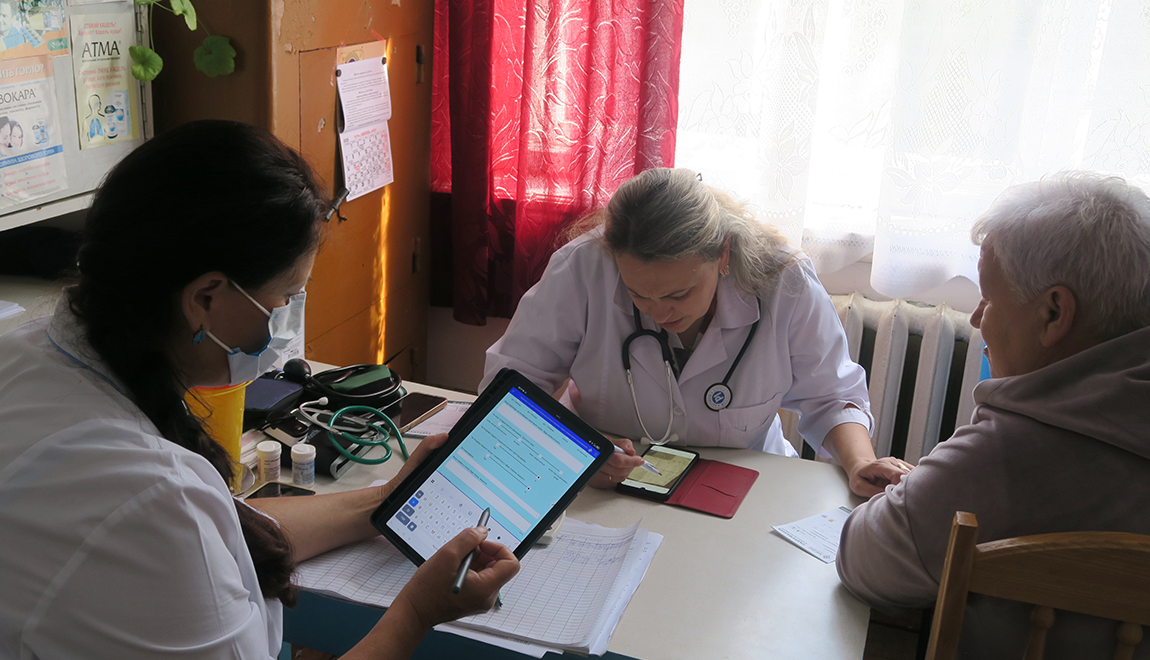 © GFA | Visit by Act4Health Medical Mobile Teams in Juravno Community, Lviv region of Ukraine.
© GFA | Visit by Act4Health Medical Mobile Teams in Juravno Community, Lviv region of Ukraine.
Bridging the Gap: Advancing Primary Health Care in Ukraine’s Remote Communities
Rural areas of Ukraine are increasingly home to ageing populations with a high prevalence of multiple chronic conditions. These communities rely heavily on accessible, affordable, and reliable health services. Yet, many primary health care facilities face severe financial and staffing constraints, leaving remote areas underserved and vulnerable. The Act4Health project, implemented by GFA Consulting Group, has provided thousands of people in Ukraine with access to medical services and gathered extensive health data related to non-communicable diseases.
Donor-supported initiatives have played a critical role in bridging this gap. Among them is the Act4Health Project, financed by the Swiss Agency for Development and Cooperation (SDC) and implemented by GFA Consulting Group in collaboration with Hôpitaux Universitaires de Genève (HUG), Women’s Health and Family Planning (WHFP), and One Health. While primarily a technical assistance initiative, Act4Health also integrates emergency response activities, supporting vulnerable populations across seven regions of Ukraine through Medical Mobile Teams (MMTs) and Home-Based Care services.
A key innovation of the project is the introduction of a digital monitoring tool, developed with GFA’s Consulting Group technical support. This platform enables real-time, 24/7 tracking of outreach activities and has replaced paper-based reporting. The integration of mobile outreach, home-based services, and digital tools has significantly expanded access to health care, demonstrating how international cooperation can overcome systemic barriers in rural health delivery.
Over the past months, the Act4Health project has achieved notable results. In just two months, more than 10,000 people accessed essential services through Medical Mobile Teams, while over 2,000 individuals received home-based care within four months. In addition, 6,048 people were screened for Body Mass Index (BMI), revealing important insights into health patterns. More than 70 % of participants presented with excess body weight, including 41.2 % classified as overweight and 29.3 % as obese, while 28.8 % had a normal weight and only 0.8 % were underweight.
Age and regional trends further highlight the challenge, as obesity prevalence increased with age, peaking among adults aged 45 to 74 years. Several hromadas communities have recorded obesity prevalence above 25 per cent, underlining the regional disparities in health outcomes. The data also show strong links between BMI and multimorbidity: 52.7% of normal weight individuals reported multiple chronic conditions, compared with 67.4 % of overweight individuals and 77.6 % of obese individuals. Risk analysis indicates that overweight people had a 1.28 times higher likelihood of multimorbidity compared to those of normal weight, while obese individuals faced a 1.47 times greater risk. Conversely, underweight individuals were less likely to report multimorbidity, with a relative risk of 0.38.
The Act4Health Project demonstrates that targeted donor support, when combined with local expertise and digital innovation, can deliver tangible improvements in health outcomes for rural and remote populations. By providing mobile and home-based care, supported by real-time monitoring, the project has extended life-saving services to thousands of Ukrainians who would otherwise remain beyond the reach of the health system.



